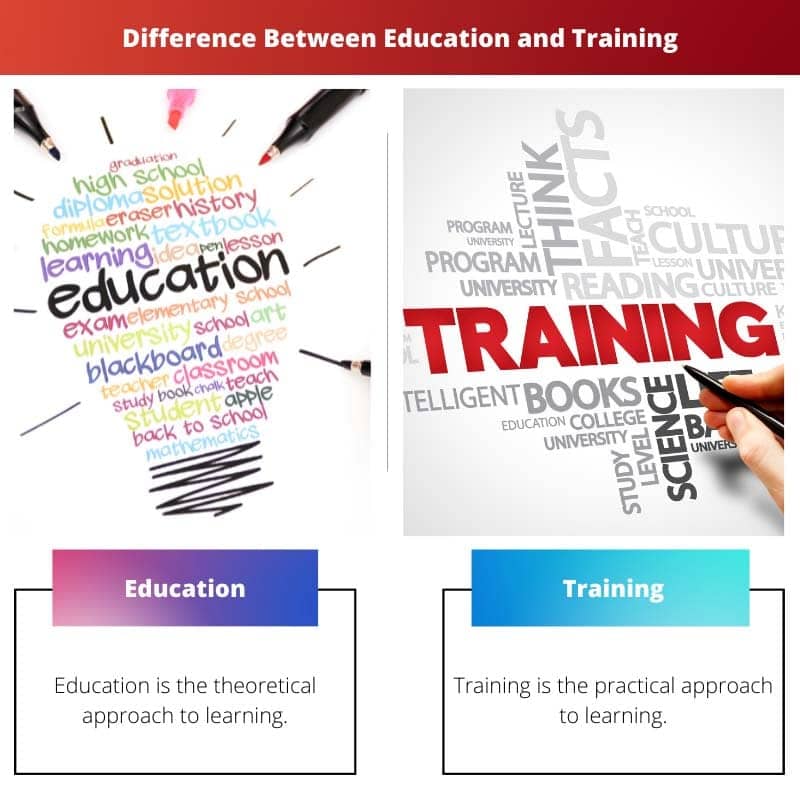In the broadest sense, education is the process of acquiring knowledge, skills, values, and self-understanding.
It implies the systematic development of an individual’s mind, body, heart, and spirit to make them an effective and well-rounded person.
Whereas training is the systematic teaching of skills or knowledge to an individual to develop their ability or knowledge.
Key Takeaways
- Education encompasses broad knowledge and skills, focusing on intellectual growth and critical thinking development.
- Training targets specific skills or competencies, geared towards professional or technical expertise.
- Education is more theoretical and long-term, whereas training is practical and immediate, addressing specific job or task requirements.
Education vs Training
The difference between education and training is that they differ in their method of approach to acquiring knowledge. Education is the theoretical approach to learning, while training refers to learning to do something by performing Or by practice. They both train two different parts of the brain.

For most, the word education conjures an image of children in classrooms. But the word can be used in many other contexts.
When used in this way, education is the act, process, or methodology of imparting or acquiring general knowledge, developing the powers of reasoning and judgment, and preparing oneself or others for a particular role in life.
There’s a range of definitions for the word training. Some forms of training are designed to develop specific job skills. Other forms involve teaching people how to do a specific task for a specific job.
Training, in general, is the action of educating or instructing someone to achieve skills in certain tasks.
Comparison Table
| Parameters of Comparison | Education | Training |
|---|---|---|
| Approach | Education is the theoretical approach to learning. | Training is the practical approach to learning. |
| Goal | The ultimate goal of education is to acquire knowledge. | The ultimate goal of training is to acquire skills. |
| Concept | Education is a broad concept of learning in general. | Training is very specific for function and hence a narrow concept. |
| Time of Learning | Education requires a long-term investment. | Training is for a short amount of time. |
| Purpose | Education is for getting a job. | Training is for improving your job skills or training for the job. |
What is Education?
Education is the process of deliberately transferring knowledge, skills, attitudes, values, beliefs, or habits from one person or group to another. It involves teaching, studying, and training.
The knowledge, skills, attitude, values, beliefs, and habits transferred to you will help you succeed in life and give you a competitive edge over those who don’t have as much education.
So, if you’re looking to get ahead and be better than your competition, you should look into getting more education.
Education is a way to improve your skills better if you’re already interested in a certain field. It can also be a good way to get into a new field you’re interested in if you’re not sure of what you want to do.
Education also improves your literacy skills, basic math skills, and critical thinking skills.
Plus, it’s always fun to learn new things! Education is the process of developing your knowledge, character, skills, and personality.
The main purpose of education is to contribute to the child’s intellectual, physical, social, and emotional development.
Education to other activities is unique in that it addresses personal issues, social roles, responsibilities, and motivations.
It differs from training, which focuses more on overt knowledge transfer. It is more of a theoretical approach to acquiring knowledge.

What is Training?
Training is conducted to impart skills and knowledge or to improve performance. One or more teachers or trainers can conduct the training or instruction.
While training is conducted, the person receiving the training is called the trainee. Training is conducted in educational establishments where there is currently not enough work.
Training has several meanings. In the workplace, training a team member is a series of events that helps a trainee learn a skill, knowledge, or another type of information, on a specific topic or task, that they do not already have.
In sports, training refers to a structured preparation, including lessons and practice, over some time, to improve fitness and technique.
In education, training refers to a process in which a person or animal learns or improves a skill or capability.
In biology, training is a process that people and animals undergo in which they learn to perform certain specific activities.
It can be considered the practical form of acquiring knowledge through experience.
It is important to undergo training. First, you have to think about how people learn best. Some people take to things better by being shown, while others learn better by being told.
Second, think about modern-day workplaces, where there’s a lot of information to take in. By training your employees, you’re ensuring that they have a range of skills and will be more efficient at their jobs.
You’re making it easy for them to learn and to create a better company as a result.

Main Differences Between Education and Training
- In simplest circumstances, education occurs in educational institutions like schools, colleges, universities, etc. Training, however, is given to job employees or business employees in their job sectors.
- Education is an independent concept. An illiterate person can acquire education from the start while training. However, it is done after a preliminary education and hence is education dependent.
- Education leads to the formation of questions, reasoning, and clarity, while training improves skills and performance.
- Education refers to learning to know, while training refers to learning to do.
- Education in the sense of learning is a lifelong process, while training is limited to a short period.




